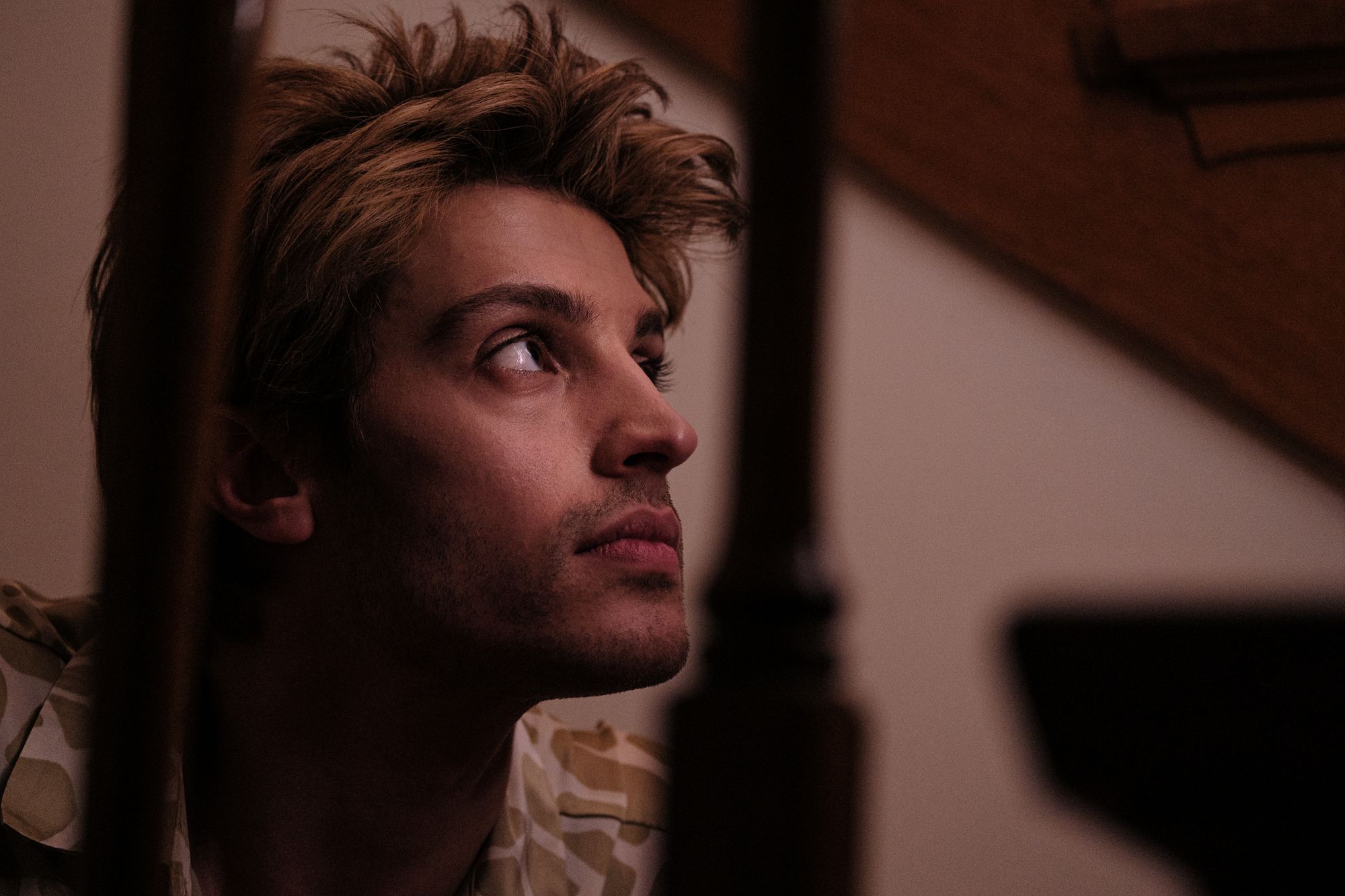Behind the Breakout: Michael Nikou
It takes a rare actor to go from, "Hmm... I'm not getting the roles I want" to, "I suppose I'll write and produce a feature film then". Rarer still is the individual who manages to pull off such a monumental undertaking.
So... We guess that makes Michael Nikou a unicorn? 🦄
Today, Slant – Michael's debut as Managing Director of BimBim Films – is touring Australia, sharing cinema space with the likes of Barbie and Oppenheimer. With his brilliant cast in tow, no less (including Aussie icon Sigrid Thornton and Dojo friends Kate Lister and Shannon Berry).
Here we speak to Michael about moving to New York at 17, narcissism, and expanding your artistry.

You moved to New York to train at The William Esper Studio, which is no small feat. What drove that decision?
Michael Nikou: I was one of those people who always wanted to be an actor, and I had a great sense of adventure and desire to explore. I like things that are a bit scary. So the idea of moving to New York at 17... I'm a Sagittarius. There is definitely an element of that.
The reason [New York] happened was that I was getting fitted for my formal suit, and the guy fitting me asked, "What are you doing after high school?" And I was like, "I want to be an actor". And he said, "My boyfriend just graduated from this acting school, the William Esper Studio", and he wrote it down on a business card. I went and read William Esper's book, and I loved it. So, I applied and interviewed – there were a couple of rounds of auditions. And, I don't know, it sort of fatalistically landed in my lap because I went to Arthur Galan in the city to have my suit fitted.
Your teacher there, Terry Knickerbocker, has taught actors such as Emmy Rossum, Natasha Lyonne, and Sam Rockwell. Was there a lesson of his that particularly struck you?
MN: Terry's a very interesting human. I was terrified of him. Not because he was abusive but because he created a real sense of "There is a right way to communicate and a wrong way to communicate" outside of the work. For instance, if something positive was said about your work, and if you said "Thank you", Terry would be like, "That's not a response". You had to really adjust how you intellectualised what you were doing.
So, in terms of what he taught me, I think it would be confidence in how I communicate. I think that as long as you're confident and have the courage of your convictions when speaking or meditating on any process of the work, then Terry respected that.
Can you talk to us about your experience of life after graduating?
MN: It was a mind f*ck, to put it bluntly. I was dealing with a sort of culture whiplash: I'd lived in New York for two years, I had fallen in love with New York, I'd fallen in love with my friends there... I had well and truly assimilated. On my very last day, I had the most beautiful, romantic day with my friends at this New York Italian Jewish wedding, and then within 24 hours, I was back in Camberwell. I cried all the way in the taxi.
And then, of course, you're on your own. There's no class to keep you busy. I moved back at 19 and did whatever I could to try and make opportunities for myself. [But] I hadn't discovered writing as an artistic outlet yet, so it was a very depressing time. That was probably the most depressed I've ever been.
Did you ever consider leaving the actor's path?
MN: I certainly had many meltdowns. But I'm like one of those bowling pins that gets knocked down and then automatically comes back up. I have a great bounce-back rate. So, I don't think I've ever seriously considered that. The cycle was: experience a failure or setback, take it very personally and have an intense meltdown, go to sleep questioning my entire existence, and then – usually by the next day – I would be like, "OK, it's not so bad".
That cycle repeated for many, many years until I found better coping mechanisms, more clarity and perspective, and discovered writing.
Let's talk about that. You decided to write – and eventually produce – a feature film. Again, no small feat. How did you get your mindset to a place where this felt possible?
MN: There have been many moments where it hasn't felt possible. But whether it was convincing myself or having a great network of people who convinced me, I just kept going.
I think, honestly, there's an element of narcissism as well. I'm not a narcissist, I don't think – I hope I'm not! – but I really do feel I should be working. And I know the grass isn't always greener on the other side, but I look at other actors who are working, and I'm like, "What's the difference between them and me?". Nothing. Genuinely nothing. I don't think I'm the most talented actor in the world or the best-looking guy, but I certainly think I'm enough to be consistently working. I think that of myself now after many years of not thinking that.
🔥🔥🔥. It's always interesting when someone who's hustled for so long finally gets widespread recognition. Does it feel like your reality has changed?
MN: No. It really does feel like I'm still just hustling. I mean, yes, I've made a feature now with a beautiful team – and we're very proud of that – but we're still hustling, and I'm still that unemployed actor.
There's a little bit more confidence and sense of self, but I don't think that has to do with the achievements of our team and Slant. I think that's just from growing up and ageing. I'm proud we did it, but I'm just an independent artist hustling away.
On that, how are you thinking about your next moves from here? Are there any values or principles you want to have guide these decisions?
MN: I have two features that I'm writing. One is an original film I've finished the first draft of called Who Hates the Papadopoulos House, and then Slant – if we should be so lucky – was planned as a trilogy, so I've also got most of Slant 2 mapped out.
And while I'll still audition and gladly take on projects I wasn't part of the genesis of, I'm passionate about being a filmmaker; a writer. I would love to eventually direct, and I'm really passionate about Australian stories. I never thought this would be me, but I'm really passionate about the landscape here in Australia and changing it and pushing it forward. I don't think we should have cultural cringe.
Then Monique Fisher, the producer of Slant, and James [Vinson], the director – I call us the Charlie's Angels of filmmaking – we very much have our fingers in each other's pies, so whatever we do next, we'll almost certainly do it together. We're going to keep trying to forge our own path because that's more exciting.
But if Spielberg calls, I'll get on the plane.
Finally, to circle back to something you mentioned earlier, what are some of the coping mechanisms and hobbies that keep you balanced and offer perspective?
MN: It's a long list. Therapy is a major one. Everyone needs to be in therapy. Another one that I've ashamedly dropped off on is transcendental meditation. But there has to be more to your life than just acting. I've got my two dogs, my beautiful housemates, my partner... [Acting] isn't everything.
External validation is a really toxic thing, and you've got to be careful about chasing that. For so much of my life, I thought that winning a role was going to make me happy. And yes, it would have made me happy, but it's not the key to my soul's Hero's Journey of happiness. Of course, we should be thrilled and excited for ourselves when we get those wins, but we can't make them the entire experience of our lives. Make sure your cup runneth over with other things.
And expand your artistic sensibilities! For a long time, I thought, "I want to be dedicated to acting. I don't want to be a jack of all trades and a master of none". That was a delusion. It was when I started to expand my artistic sensibilities and learn writing that not only did I have an amazing creative outlet, but I actually became a better actor. If you're an artist, you're probably an artist on many levels – even if you don't think you are.
Big love to Michael for his time. You can follow Michael's journey over on Instagram. Wave hello and let him know you're a Dojo homie 👋
Thoughts / feedback / challenges for us? We'd genuinely love to hear.
